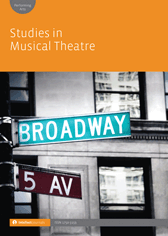A very positive review of our book was published in the journal Studies in Musical Theatre
Volume 8 Number 3© 2014 Intellect Ltd Book Reviews.
I will just quote a few lines from the review by Johanna Linsley, University of Bristol
“As Francesca Placanica notes, Berberian’s status as ‘muse’ to a series of
famous male composers occludes her own achievements. These composers
imagined her as ‘either an archetypal woman or, in a sonic equivalent, the
embodiment of the female voice’ (51). Placanica usefully deconstructs this
idea of Berberian as a force of nature or ‘phenomenon’ to be used as material,
rather than an artist in her right. Further, by reconsidering how Berberian’s
vocal practice constitutes a form of authorship, Placanica argues against ‘the
caesura between composition and performance’, and shows how Berberian
‘carr[ied] the compositional act all the way to the performance stage’ (51).
Other contributors to the book also note that this reconfiguration of performance
as composition itself has a feminist dimension. Drawing on philosopher
Adriana Cavarero, Hannah Bosma notes that ‘Western metaphysical tradition
has devalued the voice in favor of theoretical abstraction and other metaphors
of vision’ (97), and this is particularly thorny because language and abstraction
are figured as male, while voice and the body are relegated to the inessential
feminine. By activating the voice as a form of composition, Berberian’s
work subtly questions these separations.
The argument for a consideration of performance as authorship is
supported by an essay by Berberian herself on the ‘New vocality’, included
in the book. In this essay, Berberian outlines a manifesto for a new approach
to the voice and music more broadly, which is open to ‘a musical integration
of possibilities and musical attitudes not yet “officially” catalogued as emerging
from musical experience’ (47). These unofficial possibilities include popular
music – Berberian is well known for performing The Beatles’ songs in a
Baroque style – as well as everyday non-linguistic vocal sounds. Berberian is
very clear that she is not arguing for singers to produce more raw material for
composers to manipulate but instead for ‘the singer’s ability to use the voice in all aspects of the vocal process’ (48). This approach figures the performer as
a creator, rather than a vessel delivering a composer’s ideas.”


Comments